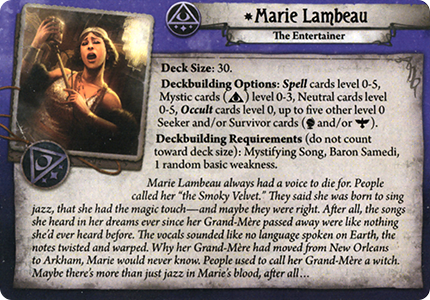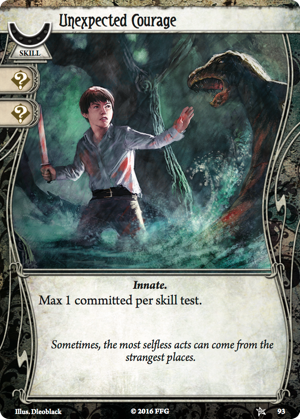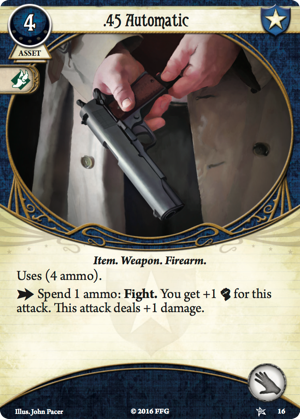We have been presented with 2 patterns so far. Core Set investigators can include cards from 2 classes - all the cards from their "main" class and cards up to level 2 from their "secondary" class. They can also use all the neutral cards. Dunwich investigators can include all the cards from their class as well as all the neutral ones. On top of that, they can include up to 5 cards of ANY other class, albeit only 0 level.
In this article I'd like to convince you, that the "Dunwich approach" is slightly inferior. And in fact it seems, game designers agree with this notion. How comes? Well, the investigators from the expansion have higher total Sanity/Stamina and their special abilities also seem to be slightly stronger (the latter notion is debatable, I agree).
I might have spoiled the surprise a bit, by jumping to the conclusion. However, I'd like to take a fair approach here and still consider all the advantages and disadvantages of both options.
 |
| Marie's Deckbuilding options - bit too fancy for my taste |
What is the biggest advantage of the Dunwich deck-building? Access to numerous alternative builds. You can try combining all sort of different cards for cool and strong combo effects or at a great synergy.
You can choose a card that matches the investigator, but does not belong to his class. Wouldn't you, after all, wish to equip Wendy with Shrivelling? That would solve her fight-related issues, or at least help with them by far. Daisy would benefit from Elusive tremendously - too bad, not her class.
You can decide to emphasise character's strengths (adding costly Assets to Jenny's deck, for instance) or mitigate their weakness (Rite of Seeking for Zoey), depending on the team (or lack of one) you're in and your personal preferences. You can also take assets, filling slots that are left free (often arcane or accessory) It all adds up to a great deal of customisation.
 |
| Regardless of the deck restrictions, pretty much an auto-include |
Or does it?
Because in fact, you can only use 5 cards! To help Skids slay his foes you might use all the available Guardian arsenal. And you most definitely want to, as there are so many useful cards there! You can easily end up with 10 or more of them. In fact, I sometimes wish to just take multiple Guardian or Seeker (depending on the build I'm into) cards for Jenny, instead of having choice of 5 among all classes. And it's an open question, what constitutes more customisation - choosing up to 5 (most probably, exactly 5) out of circa 50 (100 if we consider 2 copies, although obviously card base will grow) or up to 25 from 25?
In other words, you are forced to take 25 cards out of one class and neutrals, once again damaging the possible customisation. Once we have access to more level 0 cards per class it will extend the deck-building window. However level 0 base will, hopefully, not grow that much - I'd strongly prefer to see more high level cards. And even once it does, it also increases options for Core Set guys in both classes they have access too, doesn't it?
 |
| While The Aficionado prefers Machete, I like GUNS |
You also surprisingly often (or is it just me?) end up with using same cards over and over again, just because they are the strongest from their class. Cards like Machete, Lucky, Drawn to the Flame, Leo, Dr Milan etc. are used almost exclusively (see a very good post about staple cards to consider on Delve Too Deep). On top of it, some builds seem obviously superior and take almost all fun out of customisation away, anyway (Scavenging Rex is the best example).
Dunwich characters take the biggest hit to their adjustability, once they gain some experience. They can only take upgraded cards from one class! Jenny won't ever include upgraded Beat Cop, nor will Pete take benefit of stronger Blinding Light (which is a solid card unlike its level 0 brother). This is the most painful disadvantage for me - in the long run (and it starts to show in core set campaign already at 3 scenarios!) core set characters' decks are stronger.
As I've already confessed in my previous post I favour the "playing" part of the game over the deck-building one. With this in mind, the old investigators also feel bit more comfortable for me - instead of looking at all the level 0 cards, I just take 2 sets of cards (or 3, if counting neutrals), having more time to run the same scenario for the 20th time (still fun!). I can easily understand, however, if someone enjoys looking at all the possible interactions between cards more.1
Despite my slight bias towards core set deck-building approach I enjoy playing (most of) the new investigators and building decks for all of them. In the end, deck is just a part of all the character's capabilities. As always, I am very keen to learn your opinion!
1 I hope game designers will manage the most dreaded part of card games - avoiding creating cards that together create absurd combos. Most of the card games introduces rotation to avoid such interactions - not allowing to mix some card sets with others. Another solution is banning cards, that create too many combos (or are too strong on their own). I would be upset, if I couldn't mix all the cards (yes I know, I could o it at home, since it's a cooperative game... would still feel like cheating!) between the sets, just because an interaction or two slipped designers' attention. And having a card in collection, that ultimately will turn out game breaking would also be a negative experience.
All images are courtesy of cardgamedb.com and fantasyflightgames.com
No comments:
Post a Comment